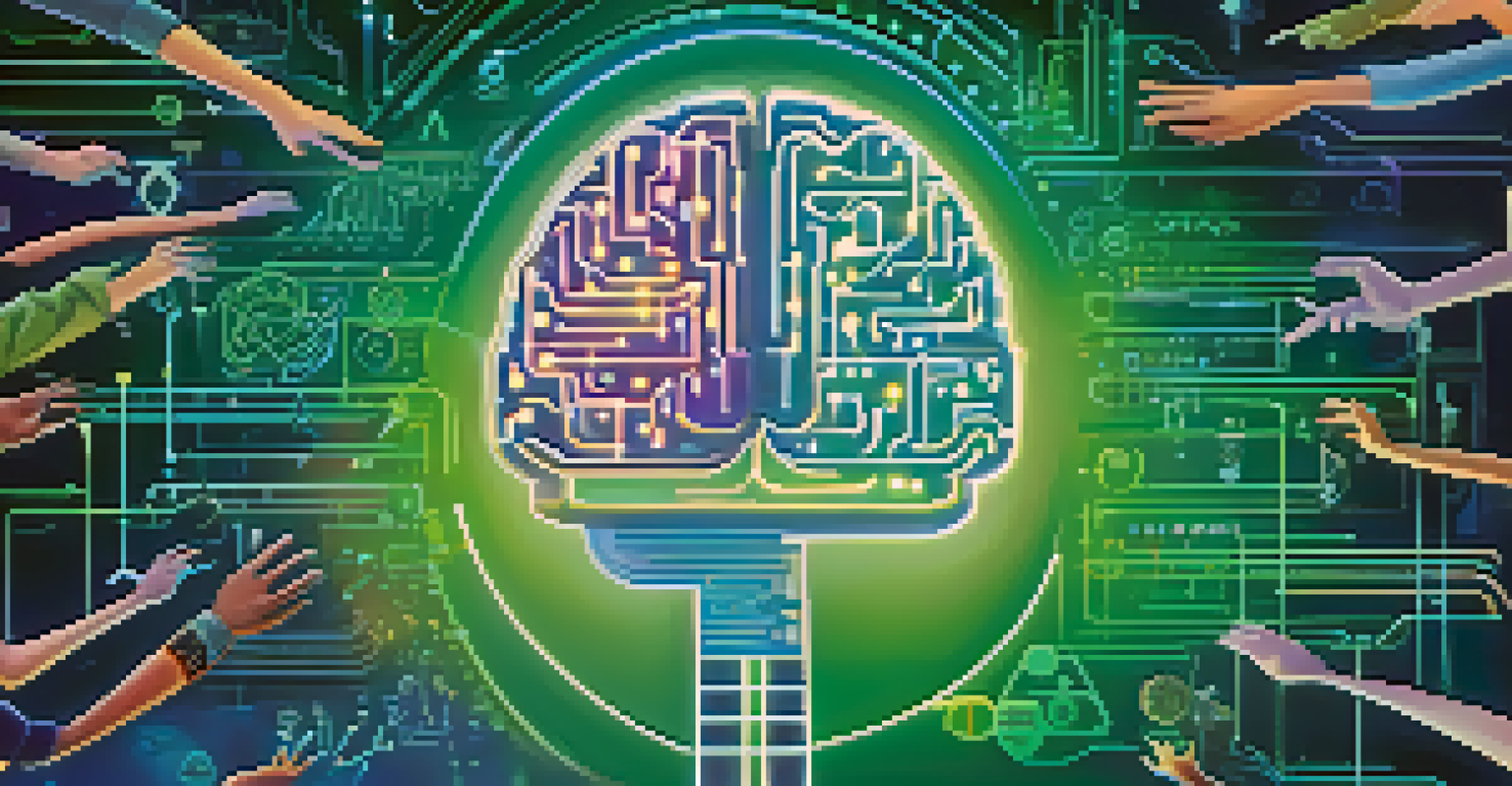AI's Impact on Curriculum Development: Ethical Insights

Understanding AI's Role in Modern Curriculum Development
Artificial Intelligence (AI) is increasingly shaping how educational curricula are designed and implemented. By analyzing vast amounts of data, AI can identify learning patterns and preferences, allowing for a more tailored educational experience. This personalization is a game-changer, as it can address individual student needs more effectively than traditional methods. However, this raises the question: how do we ensure that this technology is used ethically?
Education is the most powerful weapon which you can use to change the world.
The adaptability of AI in curriculum design means that it can cater to diverse learning styles and paces. For instance, a student struggling with mathematics can receive targeted resources that align with their unique learning curve. Yet, the reliance on AI also means that educational authorities must be vigilant about biases that could inadvertently creep into these systems. It's essential to ensure that the algorithms used are fair and equitable.
Ultimately, while AI can revolutionize how we approach educational content, it is crucial to balance innovation with responsibility. The stakes are high when it comes to shaping young minds, and ethical considerations must be at the forefront of any AI-driven curriculum development.
The Importance of Ethical AI in Education
Ethical considerations in AI are particularly vital in education, where the implications of its use can profoundly affect students' futures. AI systems can inadvertently reinforce existing biases, leading to unequal opportunities. For example, if an AI tool is trained on data from predominantly high-performing schools, it may not serve students from under-resourced backgrounds adequately. Thus, establishing ethical guidelines is paramount.

Moreover, transparency is a key aspect of ethical AI. Educators and students alike should understand how AI tools make decisions about curriculum recommendations. This helps build trust and ensures that all users feel confident in the technology's fairness. When students know how their learning paths are determined, they are more likely to engage with the material positively.
AI Personalizes Education Effectively
AI can tailor educational experiences to individual learning needs, offering targeted resources for diverse student populations.
Incorporating ethical considerations into AI development can also lead to better educational outcomes. By prioritizing equity and inclusivity, we can create environments where all students can thrive. As we navigate this evolving landscape, the education sector must take proactive steps to champion ethical practices in AI.
Potential Biases in AI Algorithms for Curriculum Design
One of the most pressing concerns regarding AI in curriculum development is the potential for bias in algorithms. If the data used to train these systems reflects societal inequalities, the resulting educational tools could perpetuate those disparities. For instance, students from marginalized communities may not receive the same level of support or resources as their peers, leading to a cycle of disadvantage.
The future belongs to those who believe in the beauty of their dreams.
To combat these biases, it's essential to implement diverse datasets that represent a wide range of student experiences. This means curating data that includes various socio-economic backgrounds, learning abilities, and cultural contexts. By doing so, we can create AI systems that are more inclusive and better equipped to serve all students equitably.
Additionally, ongoing audits and assessments of AI tools are crucial to identify and rectify any biases that may arise. Just like a teacher must adapt their lesson plans based on student feedback, AI systems should evolve based on real-world outcomes and performance data. This commitment to continuous improvement can help ensure that AI remains a force for good in education.
Data Privacy Concerns in AI-Driven Curriculum
As AI systems gather and analyze student data to personalize learning, concerns about data privacy come to the forefront. With sensitive information at stake, it’s vital for educational institutions to adopt robust data protection policies. Parents and students need to feel secure that their personal information is being handled responsibly and ethically.
Moreover, transparency regarding data usage is essential. Schools should clearly communicate how data is collected, stored, and utilized, as well as who has access to it. This openness fosters trust between educators and families, ensuring that everyone is on the same page about privacy expectations.
Ethics Are Crucial in AI Use
Establishing ethical guidelines is essential to prevent biases in AI systems and ensure equitable educational opportunities for all students.
In an age where data breaches are increasingly common, protecting student information is not just an ethical obligation; it’s a critical component of fostering a safe learning environment. By prioritizing data privacy, we can harness the power of AI while safeguarding our students’ rights.
Ensuring Inclusivity in AI-Powered Education
Inclusivity in education is crucial, and AI has the potential to either enhance or hinder this goal. When developing AI-driven curricula, it’s important to ensure that they accommodate all learning abilities and backgrounds. For example, providing resources in multiple languages or accessible formats can help bridge gaps for diverse student populations.
To foster inclusivity, educational institutions can involve various stakeholders in the AI development process, including teachers, parents, and students themselves. This collaborative approach can lead to more comprehensive insights into the needs of different learners, ensuring that AI tools are designed with everyone in mind. By prioritizing diverse perspectives, we can create a more equitable educational landscape.
Ultimately, inclusivity is not just a checkbox; it’s a commitment to creating an environment where every student feels valued and supported. By leveraging AI thoughtfully, we can personalize learning experiences that resonate with all students, regardless of their unique circumstances.
The Role of Educators in AI-Enhanced Curriculum Development
While AI offers powerful tools for curriculum development, the role of educators remains irreplaceable. Teachers are the ones who understand their students' needs and can provide context that AI simply cannot. By working alongside AI, educators can ensure that the technology is used to enhance, rather than replace, traditional teaching methods.
Moreover, educators can help guide AI systems by providing valuable feedback on their effectiveness. When teachers share their insights about what works and what doesn’t, AI tools can be adjusted to better meet the needs of students. This collaborative relationship between educators and AI developers can lead to more effective and engaging learning experiences.
Educators Enhance AI Learning Tools
Teachers play a vital role in guiding AI development, ensuring that technology complements traditional teaching methods and meets student needs.
In essence, the integration of AI into education should not diminish the importance of human interaction. Instead, it should empower educators to focus on fostering relationships and facilitating learning in ways that technology cannot replicate.
Future Directions: Balancing Innovation and Ethics in AI Education
Looking ahead, the challenge lies in balancing the innovative potential of AI with the ethical responsibilities that come with it. As technology continues to evolve, educational institutions must remain proactive in addressing the ethical implications of AI. This includes establishing clear guidelines for its use and ensuring that all stakeholders are involved in decision-making processes.
Furthermore, ongoing professional development for educators is essential to keep them informed about AI advancements and ethical considerations. By equipping teachers with the knowledge and skills they need, we can foster a culture of ethical AI use in education. This will not only benefit students but also enhance the overall learning environment.

Ultimately, the future of AI in education holds great promise, but it demands a careful and thoughtful approach. By prioritizing ethics alongside innovation, we can create a more equitable and effective educational landscape for generations to come.